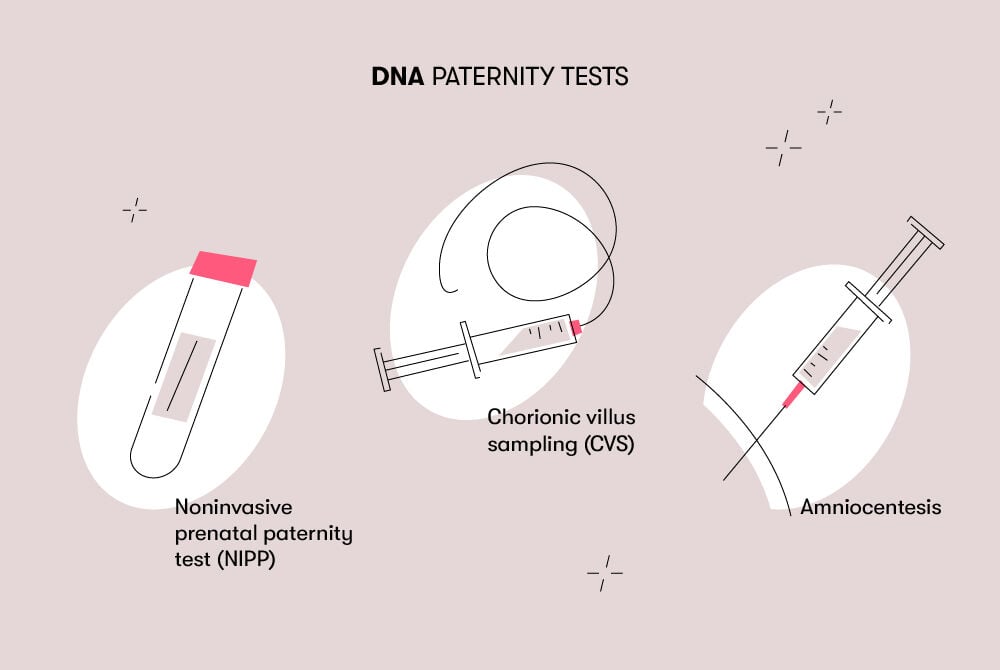A pregnant person might choose to take a paternity test before giving birth for a variety of reasons. Besides clarifying the second parent of a child, the result of a paternity test can be important for obtaining legal rights like child support, custody, benefits, and inheritance, as well as finding out medical factors that could affect your baby’s health. Keep reading to learn all about the different DNA tests you can get while pregnant plus their costs and safety profiles.
-
Tracking cycle
-
Getting pregnant
-
Pregnancy
-
Help Center
-
Flo for Partners
-
Anonymous Mode
-
Flo app reviews
-
Flo Premium New
-
Secret Chats New
-
Symptom Checker New
-
Your cycle
-
Health 360°
-
Getting pregnant
-
Pregnancy
-
Being a mom
-
LGBTQ+
-
Quizzes
-
Ovulation calculator
-
hCG calculator
-
Pregnancy test calculator
-
Menstrual cycle calculator
-
Period calculator
-
Implantation calculator
-
Pregnancy weeks to months calculator
-
Pregnancy due date calculator
-
IVF and FET due date calculator
-
Due date calculator by ultrasound
-
Medical Affairs
-
Science & Research
-
Pass It On Project New
-
Privacy Portal
-
Press Center
-
Flo Accuracy
-
Careers
-
Contact Us
Paternity Testing While Pregnant: How Can You Get a DNA Test Before Giving Birth?


Every piece of content at Flo Health adheres to the highest editorial standards for language, style, and medical accuracy. To learn what we do to deliver the best health and lifestyle insights to you, check out our content review principles.
What is a prenatal paternity test?
A prenatal paternity test checks for a match between the potential parent’s DNA and your baby while you’re still pregnant. To determine paternity, DNA is taken from the mother and potential father and examined with a series of lab tests called DNA sequencing.
Where to get a DNA test while pregnant
Noninvasive prenatal paternity tests are available at laboratories. For people in the U.S., the American Pregnancy Association recommends labs with accreditation from The American Association of Blood Banks (AABB) because they meet high standards for testing performance.
Chorionic villus sampling (CVS) and amniocentesis tests are normally done at a health care provider’s office or an outpatient facility and sent to a lab for analysis.
DNA paternity test cost
The cost of a DNA test while you’re pregnant varies depending on the type of test. In the U.S., amniocentesis or CVS testing can cost over $500, while non-invasive tests are more expensive — around $1350 to $1750 depending on how quickly you want the results. Health insurance companies usually don’t cover this cost.
How accurate are prenatal paternity tests?
These tests are extremely precise. They show with 99.9 percent accuracy whether a male is the parent of the baby.
Take a quiz
Find out what you can do with our Health Assistant
What types of paternity tests are available?
People who want to take a paternity test before birth have three options.

Noninvasive prenatal paternity test (NIPP)
From week seven of pregnancy through the first trimester, you can get a noninvasive prenatal paternity test. During this test, DNA is collected from the mother by a blood draw and from the father with a cheek swab. The samples are analyzed to compare the baby’s and possible father’s DNA. In general, results are available after one week.
However, this test is not available for women carrying twins because the current technology can’t isolate DNA from both fetuses.
Chorionic villus sampling (CVS)
In this procedure, a small tissue sample is taken from the placenta through the cervix or abdomen. The sample is then compared to the potential father’s DNA. Generally, the test occurs between weeks 11 and 14 of pregnancy. Results can take several weeks.
Unlike NIPP, this invasive sampling procedure does pose a risk to the baby.
CVS can indicate whether a baby has a chromosomal condition like Down syndrome or genetic disorders like cystic fibrosis.
Amniocentesis
During amniocentesis, amniotic fluid is drawn with a needle from the pregnant parent’s abdomen. Then, the fluid sample is compared in a lab to DNA taken from the pregnant parent and potential father. This test typically takes place from weeks 15 to 20 of pregnancy. The results may not be available for several weeks.
Like CVS, this invasive sampling procedure does pose a risk to the baby.
You may prefer CVS or amniocentesis if:
- The results from a prenatal screening test are positive or worrisome.
- A previous pregnancy was influenced by a chromosomal condition or Down syndrome.
- You’re over the age of 34.
- You or your partner have a history of genetic conditions in the family.
- Your ultrasound has shown abnormal results.
Are DNA paternity tests safe?
Noninvasive prenatal paternity tests are considered by experts to be highly accurate and completely safe for both the pregnant parent and baby.
Amniocentesis and chorionic villus sampling are invasive paternity tests that carry more risks. Unless they’re needed to diagnose a severe genetic disorder, they are not usually recommended by health care providers.
Potential risks of chorionic villus sampling include:
- Miscarriage: There is an estimated 0.22 percent chance of miscarriage with CVS.
- Infection: In rare cases, CVS can trigger an infection in the uterus.
- Rh sensitization: CVS can make some of your baby’s blood enter your bloodstream, which can damage the baby’s red blood cells. If you have Rh-negative blood and don’t have antibodies to Rh-positive blood, you’ll be injected with Rh immune globulin to stop your body from producing Rh antibodies that can harm the baby.
Additionally, if you have any of the following conditions, your health care provider may recommend avoiding CVS:
- An active infection in the cervix or vagina (like herpes)
- Bleeding or spotting from the vagina in the past two weeks
- An inaccessible placenta due to a tilted uterus
- Benign growths in the cervix or lower uterus
After CVS, if you experience fluid leaking from your vagina, heavy vaginal bleeding, a fever, or contractions in your uterus, contact a health care provider right away.
Potential risks of amniocentesis can involve:
- Leaking amniotic fluid: Amniotic fluid can leak from the vagina.
- Miscarriage: Amniocentesis done during the second trimester carries a 0.1 to 0.3 percent chance of miscarriage. The risk is higher when the test is done before week 15 of pregnancy.
- Needle injury: If your baby moves into the needle’s path, they could experience an injury.
- Rh sensitization: Rarely, Rh sensitization can occur when a parent with Rh-negative blood is exposed to Rh-positive blood from the fetus.
- Infection: A uterine infection may result from sampling.
- Infection transmission: If you have HIV/AIDS, hepatitis B or C, or toxoplasmosis, it could transfer to your baby.
Prenatal paternity tests can help you get answers to important questions while you’re still pregnant. Consider your options and speak to your health care provider about which option suits your goals.


Hey, I'm Anique
I started using Flo app to track my period and ovulation because we wanted to have a baby.


The Flo app helped me learn about my body and spot ovulation signs during our conception journey.


I vividly
remember the day
that we switched
Flo into
Pregnancy Mode — it was
such a special
moment.
Real stories, real results
Learn how the Flo app became an amazing cheerleader for us on our conception journey.




